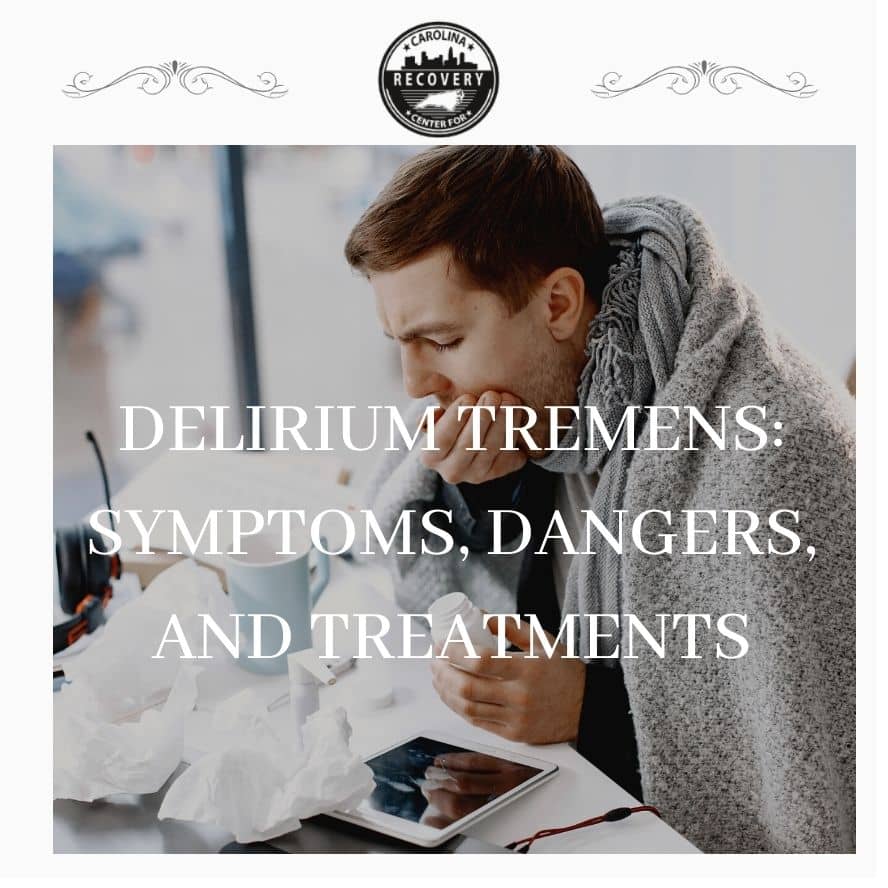Delirium Tremens: Symptoms, Dangers, and Treatment Protocols

Medically Verified: 2/1/24
Medical Reviewer
Chief Editor

All of the information on this page has been reviewed and verified by a certified addiction professional.
Alcoholism is a serious and progressive condition that can wreak havoc on a person’s life. When someone repeatedly abuses alcohol in large amounts, they will experience health complications. One of the most dangerous aspects of alcohol addiction is the withdrawal symptoms associated with dependency on the substance.
Alcohol withdrawal can cause an array of awful symptoms, from shakiness and aggravation to rapid heart rate and seizures. Individuals with a severe form of alcohol use disorder are at risk of developing even more sinister symptoms of withdrawal known as delirium tremens (DTs). This condition is a serious form of alcohol withdrawal that includes symptoms such as shaking, confusion, and hallucinations.
DTs usually begin 2 to 3 days after someone stops using alcohol. This condition is a medical emergency, as it can lead to death in some cases. The mortality rate is at a staggering 35%, showing the importance of receiving prompt medical treatment.[1]
Causes of Delirium Tremens (DTs)
Because alcohol is a depressant, it slows down the central nervous system when it is ingested. After an individual has been drinking for a long time, stopping will cause their brain and nervous system to be unable to adjust quickly enough. This causes the brain to become overstimulated.
Individuals with alcoholism who suddenly stop drinking could experience a spike in an amino acid known as glutamate, which causes the symptoms associated with delirium tremens. These symptoms may include sudden and extremely high blood pressure, tremors, heightened excitability, and seizures.
Delirium tremens is most common among the following individuals:
- Young adult men who are white
- People with a history of seizures
- People who have experienced alcohol withdrawal before
- Heavy, long-term drinkers
People who drink heavily are more at risk of developing DTs. For women, this is described as having more than 8 drinks per week. For men, heavy drinking is defined as 15 or more drinks per week.
What are the Symptoms of Delirium Tremens?
Delirium tremens is a form of alcohol withdrawal that causes severe and life-threatening symptoms. People who are planning to quit drinking alcohol after a period of dependency should always attend a professional detox program where they can receive proper treatment.
With that being said, the less severe symptoms of DTs include:
- Excitement or fear
- Bursts of energy
- Sensitivity to touch, sound, and light
- Extreme sleepiness
- Excessive fatigue
The scary and life-threatening symptoms of DTs may include:
- Delirium (confused thinking and reduced awareness of surroundings)
- Visual and auditory hallucinations
- Extreme and severe confusion
- Nausea and vomiting
- Chest pain
- Fever
- Changes in mental functioning
- Seizures
Seizures are the most concerning symptom associated with DTs, as the most common form of seizure individuals experience is the generalized tonic-clonic type. This type of seizure affects the entire body, often leading to hallucinations and dizziness. Additionally, people may experience symptoms such as violent muscle contractions and loss of consciousness.
The Dangers of DTs
The first danger associated with DTs is that many people who experience alcohol withdrawal symptoms avoid attending a professional detox program. Without proper medical intervention, the mortality rate associated with this condition is extremely high. In other words, if people do not receive medical care the first and most concerning danger of delirium tremens is death.
In addition to death, there are some risks associated with experiencing DTs. These include:[2]
- Seizures
- Disorientation
- Hypertension (high blood pressure)
- Hyperthermia (extremely high body temperature)
- Altered mental status
- Global confusion (sudden and temporary loss of memory)
- Arrhythmias
- Aspiration pneumonitis (breathing in food and liquids instead of swallowing)
- Respiratory failure
- Death
DTs can cause a person’s body temperature, breathing, and blood circulation to change rapidly. Because of this, someone could experience symptoms such as sepsis, irregular heartbeat, trouble breathing, seizures, and an electrolyte imbalance. People experiencing delirium tremens require hospitalization, and if someone is experiencing the symptoms of this condition 911 should be contacted immediately.
Thankfully, with proper treatment, the mortality rate for delirium tremens is less than 5%.[2] This means that receiving effective medical care is the best way to prevent serious symptoms of DTs from occurring.
How is Delirium Tremens (DTs)Treated?
Delirium tremens must be treated in a hospital setting, as IV fluids will be given to balance electrolytes and treat dehydration. Additionally, benzodiazepines may be provided to calm the nervous system, as an overly excited CNS is what causes many of the life-threatening symptoms of this condition.
The overall goal of DT treatment is to control agitation, decrease one’s risk of seizures, and decrease the mortality rate. Other treatments provided by the hospital include:
- Antipsychotic medications to prevent hallucinations and delusions
- Anticonvulsants to prevent/stop seizures from occurring
- Blood pressure medications to manage high blood pressure
- Medications to regulate the heartbeat and prevent arrhythmias
- Pain medications to manage symptoms
The symptoms can last for up to a week, requiring hospitalization and treatment the entire time. After someone completes treatment for DTs, they will need to enter a treatment program for recovery from alcoholism.
Finding Help for Severe Alcohol Use Disorder
If you or a loved one suffer from a drinking problem, it’s time to seek help. Not only can heavy drinking lead to financial issues, social isolation, and mental health problems, but it can also lead to life-threatening withdrawal symptoms
Getting treatment sooner rather than later can save your life. Contact Carolina Recovery Center today to learn more about our alcohol rehab center in North Carolina.
References:

